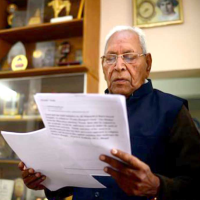Batra’s Textbooks Criticized as an Attempt to Saffronise Education
 Delhi-based Dinanath Batra (photo: Livemint)
Delhi-based Dinanath Batra (photo: Livemint)
Hindu activist Dinanath Batra, who was responsible in February for getting Penguin India to pulp historian Wendy Doniger’s book on Hinduism, now finds himself at the centre of a controversy surrounding his own books that have been supplied to schools in Gujarat as secondary reading.
His books have been criticised as “fantasy” for preaching about ancient India’s gurukul style of learning, using anecdotes such as a story about a royal couple being blessed with children only after cow-worship, and for redrawing the map of India to include its neighbours as a part of ‘Akhand Bharat’ (Undivided India).
85-year old Batra is a retired school principal and the founder of Shiksha Bachao Andolan Samiti (Save Education Struggle), a loose network of right-wing teachers, lawyers and Hindu nationalists who seek to promote ‘bharatiya sanskriti’ or Indian culture.
According to the Indian Express, on 30 June the Gujarat “state government issued a circular directing more than 42,000 primary and secondary government schools across the state to make a set of nine books by Batra, translated from Hindi to Gujarati, part of the curriculum’s 'supplementary literature'."
The state administration is run by the BJP, which is also in power at the Centre.
"These books, with several references by Dina Nath Batra from our rich history, will help our students develop moral values and that should be considered an integral part of education," Bharat Pandit, Director of Gujarat State School Textbook Board, told the newspaper.
Yet the books include many inaccurate and politically incorrect statements, with Batra interpreting history through stories about rishi-munis (sages and seers), dev-daanav (deities and demons) and “heroes” of pre-Independence India.
According to media reports, Batra’s books suggest that birthdays should not be celebrated by blowing candles as this practice is Western. Instead, he wants birthdays to be marked by wearing Indian clothes, organising havans, reciting mantras such as the Gayatri mantra, and feeding cows.
He also feels that there is no need for English language education, instead advocating a three-language solution: teaching in the mother tongue, Hindi as a second language, and the remaining “20 percent for Sanskrit”.
His critics claim his books are an attempt to saffronise India’s education curriculum as part of a wider political programme.
Romila Thapar, one of the leading scholars of ancient Indian history, told Hindustan Times that Batra’s books contain “not history, but fantasy”.
Another historian, S Irfan Habib, pointed out that Batra's “hilarious but scary” textbooks were being introduced in Gujarat’s schools without any vetting process. “Young minds are being exposed to misinterpretations of the past and even the present,” he told Hindustan Times.
Habib said this controversy was not a debate of left versus right. “The point here is whether the person has any semblance of scholarship, any track record.”
That hasn’t stopped Batra, who has now written to the Human Resources Development Ministry, demanding an overhaul of the education curriculum.
The tireless activist has made a series of proposals, such as no foreign collaborations for the CBSE examination, a ban on the teaching of foreign languages in school, and the setting up of a call centre to inculcate “values and nationalism” in students.
- Top Stories
- Controversies
- Where is the Money Going?
- India and the World
- Appointments and Resignations
- Unusual News
- Latest News
- India College Chain’s Expansion into U.S. Draws Opposition from Massachusetts Officials over Quality of Education
- Milk Shortages in India Tied to Release of New Movies Featuring Nation’s Favorite Stars
- Confusion Swirls around Kashmir Newspaper Ban in Wake of Violent Street Protests
- Polio-Free for 5 Years, India Launches Vaccine Drive after Polio Strain Discovery
- New Aviation Policy Could Increase Service, Lower Ticket Prices






Comments